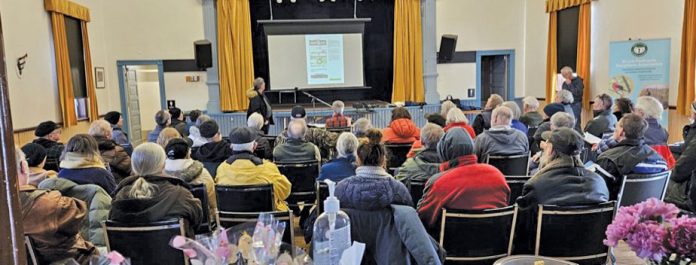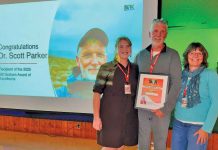
Submitted by Donna Cole,
Bruce Peninsula Biosphere Association
Heat Pumps – A Popular Topic in the Bruce and Across North America!
On February 24, 2024, the Bruce Peninsula Biosphere Association, in collaboration with the municipality’s Climate Action and Waste Diversion Committee, hosted a workshop to explain how heat pumps work and the benefits to both our climate and to users. More than 50 people attended the workshop at the Rotary Hall in Lion’s Head, an outstanding turnout!
Local experts shared their knowledge on energy audits, heat pump uses and the installation process along with local users who shared their own case studies. The audience was very engaged and had many questions for our presenters.
In Canada, more than 700,000 heat pumps are installed nationwide (Global Newswire) and throughout the U.S., heat pumps are now surpassing gas furnace sales (New York State Energy and Development Authority).
What is an Energy Audit?
Dan Blenkinsop from Greenbrain Inc., shared detailed information about energy audits and grant programs.
An energy audit includes calculating the heated volume of your home, determining the heat resistance of the building envelope, counting the number of rough openings in the house, documenting the HVAC system, and performing a blower door test to calculate the home’s air tightness. Once these audits are completed, a homeowner will know how to increase the efficiency of the home to save on energy costs and reduce greenhouse emissions. This is a key step in understanding how a heat pump system can help.
Heat Pump Options
Eric Crose from Crose Mechanical, helped us to understand types of heat pump options, and the types of installations that will work best for you!
“Heat pumps are very efficient ways to heat your home and provide summer air conditioning. A heat pump works just like an air conditioner in the summer, absorbing heat from the inside air and sending it outside via the change of state of the refrigerant in the lines. In the winter the system reverses and provides heat indoors very efficiently” explained Eric. You can convert your current ducted furnace system to a heat pump system and reuse the current ductwork.
If running ductwork through your house isn’t appealing (or readily available), consider “ductless split” heat pumps as an option. These are extremely efficient and can provide variable temperatures for different rooms or parts of your home as needed.

Case Studies from Local Residents: Saving Money and Reducing Greenhouse Gases in Tobermory
Mike Campbell from Tobermory shared their family’s decision on why they wanted to transition to a heat pump from a propane furnace and woodstove system. According to Mike, “We wanted to reduce the amount of greenhouse gases that we used as a family, and we also wanted to save money by switching to a more efficient heat source. We completed the energy audit and made improvements to the efficiency of the home. We then installed a ducted heat pump. Our annual savings in reducing propane and wood consumption saved us over $1,500, and over 5,600 kg of carbon last year! With our Green Energy rebate and annual savings, we will have paid for the installation within 7 years.”
Lion’s Head Heat Pump Works with In-Floor Heating Saves Propane, Wood, and Reduces CO2
Rod Layman from Lion’s Head shared how he installed a heat pump to work with his hydronic in-floor heating system. The system worked so well that he installed a radiator on the second floor, where there had been no heat before, as well as in his shop, heated a hot tub, and a portion of his domestic hot water. Rod reduced his CO2 emissions by 8,000 kg/year, and reduced propane use to zero from 1,300 litres per year, and wood from 12 cords to 6. His net savings amounted to $600/year with increased electricity costs offset by no propane and less wood. But also, Rod has converted to an induction stove from propane, and has switched to an electric car. If you add in gasoline saving, Rod is saving $1,800/year. Lower carbon emissions, a more comfortable home, and less money spent on fuel. That’s a win/win/win!
For more information or if you wish to install a heat pump, please go to BPBA.ca or contact:
• Dan Blenkinsop, https://www.greenbraininc.com/ Phone; 1-866-848-4998
• Eric Crose, Crose Mechanical, https://www.crosemechanical.ca/ Phone; 519-372-2978














